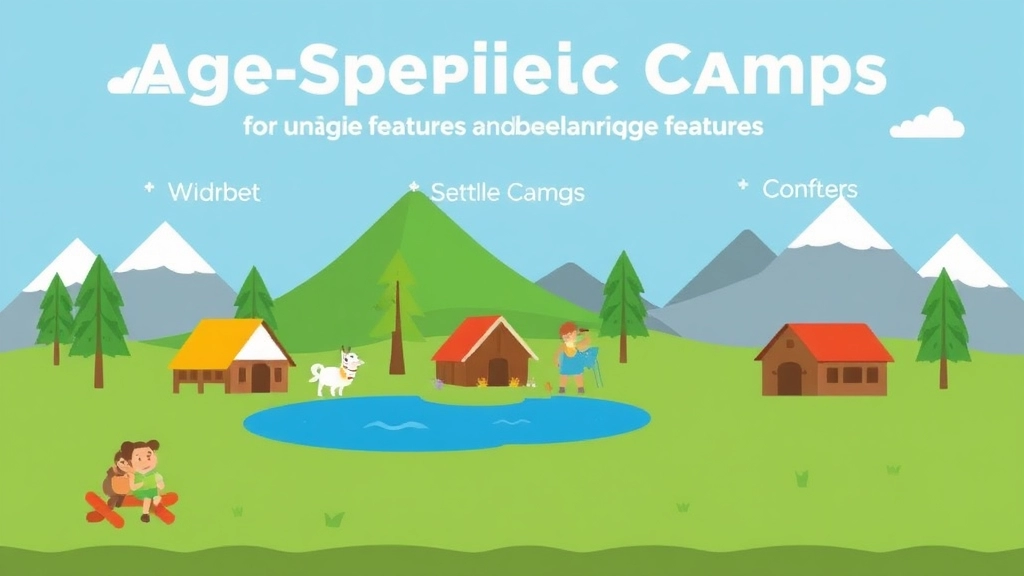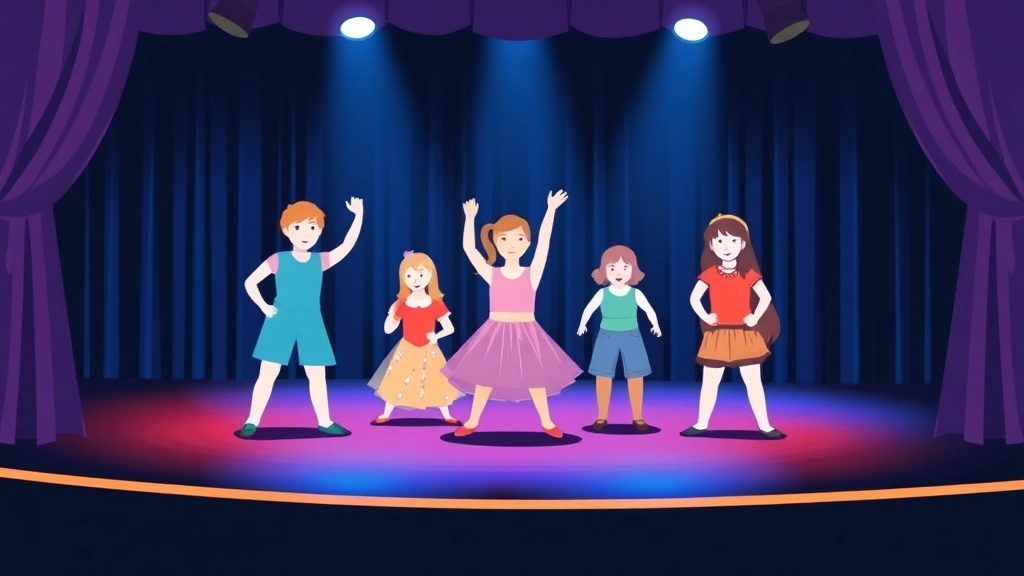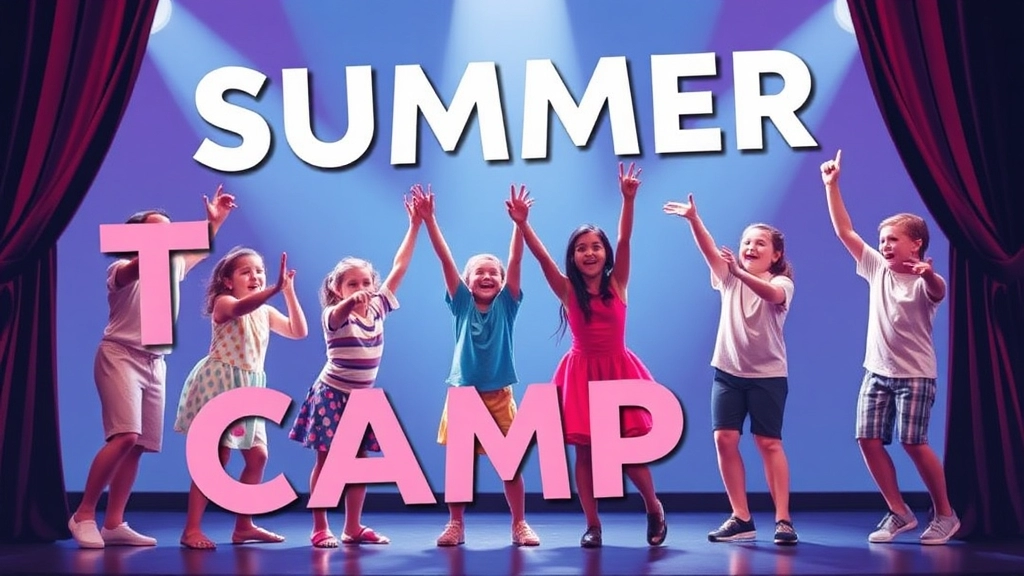Choosing the Right Summer Musical Theatre Camp
Choosing the right summer musical theatre camp for your child can be a daunting task, but it’s also an exciting opportunity to enrich their lives in various ways. From skill development to building confidence and fostering teamwork, these camps offer a comprehensive experience that goes beyond just acting, singing, and dancing. In this article, we’ll guide you through the essential aspects of selecting the perfect camp, understanding the activities involved, and exploring the benefits your child will gain.
What to Expect
We’ll delve into age-specific camps and their unique features, highlight the behind-the-scenes technical theatre tracks for older students, and discuss the audition processes and final performances that make these camps so rewarding. Additionally, we’ll cover the financial aspects, including costs, scholarships, and financial aid options, and provide insights into extended care and camp logistics for busy parents. By the end, you’ll have a clear picture of how a summer musical theatre camp can be a transformative experience for your child.
Choosing the Right Summer Musical Theatre Camp for Your Child
So, you’re thinking about sending your child to a summer musical theatre camp? Great choice! But let’s be real, picking the right one can feel like navigating a maze. With so many options out there, how do you know which camp is the best fit for your budding star? Let’s break it down.
What Are Your Child’s Interests and Goals?
First off, what does your child want out of this experience? Are they looking to refine their acting skills, or are they more interested in singing and dancing? Maybe they want a taste of everything. Here’s a quick checklist to help you figure it out:
- Acting: Does your child love to take on different characters and tell stories?
- Singing: Are they always belting out tunes in the shower or car?
- Dancing: Do they have a knack for picking up choreography and moving to the beat?
- Technical Theatre: Are they curious about what happens behind the scenesâlike lighting, sound, and set design?
Types of Camps: Day vs. Residential
Next up, consider the type of camp. Day camps are great if you want your child to come home every evening. They’re usually more affordable and can be easier to manage with your schedule. On the other hand, residential camps offer a more immersive experience. Kids get to live and breathe theatre 24/7, which can be incredibly enriching.
Camp Reputation and Reviews
Do your homework. Look up reviews and testimonials from other parents and campers. A camp’s reputation can tell you a lot about what to expect. Check out their social media pages and see what people are saying. Are the instructors experienced? Do they have a history of putting on successful performances?
Curriculum and Skill Development
What will your child be learning? A good camp should offer a balanced curriculum that covers various aspects of musical theatre. Look for camps that offer:
- Workshops: These can range from voice training to stage combat.
- Masterclasses: Sometimes, camps bring in professional actors and directors to teach.
- Performance Opportunities: Will your child get to perform in a final showcase?
Location and Logistics
How far are you willing to travel? The location of the camp can be a deal-breaker. If it’s too far, consider the logistics of getting your child there and back. Some camps offer transportation options, so check if that’s available.
Cost and Financial Aid
Let’s talk money. Theatre camps can be pricey, but many offer scholarships or financial aid. Don’t let the cost deter you without exploring these options. Make sure to factor in all costs, including materials, costumes, and any extra activities.
Safety and Supervision
Lastly, how safe is the camp? Ensure that the camp has proper safety protocols in place. This includes background checks for staff, emergency procedures, and adequate supervision ratios.
Skill Development Opportunities in Summer Theatre Camps

Ever wondered if your child is getting the most out of their summer?
Are you worried they might miss out on crucial skills?
Summer theatre camps might just be the answer.
Let’s dive in.
What Skills Can Your Child Develop?
These camps aren’t just about singing and dancing.
They offer a treasure trove of skills.
Here’s what your child can gain:
- Acting Techniques: Learning how to express emotions convincingly.
- Vocal Training: Improving pitch, tone, and projection.
- Dance: Mastering choreography and movement.
- Improvisation: Thinking on their feet and building creativity.
- Script Analysis: Understanding character motivations and story arcs.
- Collaboration: Working with directors, peers, and crew.
Why Are These Skills Important?
Think about it.
These aren’t just theatre skills.
They’re life skills.
Communication improves.
Confidence skyrockets.
And teamwork?
It becomes second nature.
Real Stories, Real Growth
I remember a parent telling me about their shy daughter.
She joined a camp.
By the end of the week, she was leading a scene.
That’s the power of theatre camps.
How to Choose the Right Camp
Not all camps are created equal.
Here’s what to look for:
- Experienced Instructors: Teachers who know their stuff.
- Diverse Activities: A mix of acting, singing, and dancing.
- Supportive Environment: A place where kids feel safe to express themselves.
Explore the world of summer theatre camps and watch your child thrive.
For more insights, check out our section on Choosing the Right Summer Musical Theatre Camp for Your Child.
Camp Activities: What to Expect in a Week-Long Theatre Camp
Ever wonder what a week-long theatre camp actually looks like? I mean, if you’re like most parents, you’re probably asking: “What exactly will my kid be doing all week?” Trust me, these camps are packed with activities that keep kids engaged, learning, and having a blast. So, let’s break it down.
Day 1: Ice Breakers and Introductions
First things first, your child will meet their fellow campers and instructors. This isn’t just about names and handshakes. It’s about building a team. They’ll play ice-breaker games that get everyone laughing and feeling comfortable. By the end of the day, they’ll feel like they’ve known each other forever.
- Name games: Helps everyone remember each other’s names.
- Trust exercises: Starts building that essential team spirit.
- Camp tour: Familiarises everyone with the camp layout.
Day 2: Skill Workshops
Day two is where the magic starts. Kids dive into workshops focused on acting, singing, and dancing. These sessions are led by experienced instructors who know how to make learning fun and effective.
- Acting workshops: Think improv games and scene work.
- Singing lessons: Vocal warm-ups and learning new songs.
- Dance classes: Basic choreography that even beginners can master.
Day 3: Rehearsals Begin
Now, it’s time to start putting it all together. Your child will begin rehearsing for the big showcase at the end of the week. This is where they start to see how their individual skills come together in a full production.
- Blocking scenes: Learning where to stand and move on stage.
- Choreography practice: Refining those dance moves.
- Vocal rehearsals: Harmonising with the group.
Day 4: Behind-the-Scenes Fun
It’s not all about being in the spotlight. Day four often includes behind-the-scenes activities that give kids a taste of technical theatre. This could be anything from set design to costume fittings.
- Set design workshop: Building and painting sets.
- Costume fittings: Trying on costumes and making adjustments.
- Prop making: Crafting the little details that make the show pop.
Day 5: Dress Rehearsal
Day five is crunch time. It’s the dress rehearsal, where everything comes together. This is a full run-through of the show, complete with costumes, props, and set changes. It’s a chance to iron out any last-minute kinks.
- Full run-through: Performing the show from start to finish.
- Technical rehearsal: Ensuring lights, sound, and set changes are seamless.
- Final tweaks: Making any last adjustments to ensure a smooth performance.
Day 6: Showtime!
The big day has arrived. Your child’s hard work culminates in a final performance, often open to family and friends. It’s a chance for them to showcase everything they’ve learned and to shine in the spotlight.
Age-Specific Camps and Their Unique Features

So, you’re thinking about sending your child to a summer musical theatre camp, but you’re not sure which age-specific camp is right for them.
Let’s break it down.
Why Age-Specific Camps?
Parents often wonder if their child will fit in or if the camp will be too advanced or too basic for them. That’s where age-specific camps come in.
These camps are tailored to meet the developmental and skill levels of different age groups.
For the Little Ones (Ages 5-8)
This is where the magic begins.
- Play-Based Learning: Kids engage in activities that feel more like play than learning. Think fun games that teach basic theatre skills.
- Short Performances: Instead of full-blown productions, they might do short skits or scenes. Keeps it light and fun.
- Creative Expression: Lots of arts and crafts, singing, and dancing. They get to let their imaginations run wild.
Tweens (Ages 9-12)
This is where things start to get a bit more structured.
- Skill Building: Camps at this age focus on developing basic acting, singing, and dancing skills.
- Workshops: More focused activities like voice training, improvisation, and basic choreography.
- Mini Productions: They might put on a short musical or a series of scenes. It’s about testing the waters.
Teens (Ages 13-17)
Now, we’re talking serious business.
- Advanced Training: These camps often have professional instructors teaching advanced techniques.
- Specialised Tracks: Some camps offer specialised tracks in acting, singing, or dancing. You get to focus on what you love.
- Full Productions: Teens usually work on a full-scale musical. This is the real deal.
Unique Features Across Age Groups
- Workshops and Masterclasses: No matter the age, camps often bring in guest artists for special workshops.
- Peer Interaction: Kids get to meet others who share their passion. Friendships made here can last a lifetime.
- Performance Opportunities: Every age group gets a chance to perform, whether it’s a small showcase or a full production.
Why It Matters
Choosing the right age-specific camp ensures your child is both challenged and comfortable. They’ll get the most out of the experience, and you’ll see them grow in ways you never imagined.
## Behind-the-Scenes: Technical Theatre Tracks for Older Students
Ever wondered if your teen is more into the spotlight or the magic behind the curtain? Choosing the right path in a summer musical theatre camp can be a game-changer. If your child is fascinated by the backstage hustle, technical theatre tracks might be the perfect fit. Let’s break it down.
### Why Choose Technical Theatre?
**Real Talk:** Not every kid wants to be centre stage. Some are captivated by the mechanics of a production. From lighting to sound, these roles are crucial. So, why not nurture that interest?
#### Key Components of Technical Theatre
– **Lighting Design**
– Understanding light plots
– Programming light boards
– **Sound Engineering**
– Mixing audio for live performances
– Microphone placement and usage
– **Set Design and Construction**
– Building sets from scratch
– Learning about materials and tools
– **Costume and Makeup**
– Designing costumes
– Applying stage makeup
### What Makes Technical Tracks Unique?
**Story Time:** I remember chatting with a parent whose child attended a camp focused on technical theatre. Her son came home buzzing about how he had designed the lighting for the final showcase. It wasn’t just about learning; it was about creating something tangible.
#### Benefits for Older Students
– **Skill Development:** Gain hands-on experience in various technical roles. Check out [top theatre summer camps for kids and teens](https://summercamp.blog/top-theatre-summer-camps-for-kids-and-teens/) for more options.
– **Problem-Solving:** Learn to think on your feet when things go sideways.
– **Teamwork:** Collaborate with performers and directors to bring a vision to life.
### Real Concerns, Real Solutions
**Worry:** “Will my child miss out on the fun of performing?”
**Solution:** Technical tracks often include collaborative projects where students work closely with performers, ensuring they’re part of the action.
### How to Choose the Right Camp
– **Research:** Look for camps with a strong focus on technical training.
– **Ask Questions:** Does the camp offer opportunities to work on actual productions?
– **Check Reviews:** See what other parents and students have to say. You might also explore [top acting summer camps for aspiring actors](https://summercamp.blog/top-acting-summer-camps-for-aspiring-actors/) for related interests.
Benefits of Theatre Camps: Building Confidence, Creativity, and Teamwork

Ever wondered why theatre camps are a big deal for kids?
Let’s dive into it.
Building Confidence
Kids can be shy, right?
They might struggle to speak up in class or make new friends.
Theatre camps change that.
Imagine your child stepping onto a stage in front of an audience.
Scary? Yes.
But they do it, and it’s like a switch flips.
They realise they can do hard things.
That confidence spills over into school and life.
Boosting Creativity
Creativity isn’t just for artists.
It’s problem-solving.
It’s thinking outside the box.
In theatre camps, kids get to play different characters.
They invent stories.
They even help with costumes and props.
It’s a playground for their imagination.
Teamwork
Ever tried putting on a play alone?
Impossible.
Kids learn to work together.
They rely on each other.
They understand the importance of every role, from the lead to the stagehand.
It’s a crash course in collaboration.
Why It Matters
These skills—confidence, creativity, teamwork—they aren’t just for theatre.
They’re life skills.
Your child will carry them into everything they do.
Real Stories
I remember a kid named Jack.
He was quiet, always in the background.
After a week at theatre camp, he was a different person.
He nailed his lines.
Made friends.
His mum couldn’t believe the change.
Quick Recap: Benefits of Theatre Camps
- Confidence: Overcoming stage fright, speaking up
- Creativity: Storytelling, problem-solving
- Teamwork: Collaboration, understanding roles
Why Choose a Theatre Camp?
Because it’s not just about acting.
It’s about growing as a person.
Related Topics to Explore:
- Choosing the Right Summer Musical Theatre Camp for Your Child
- Skill Development Opportunities in Summer Theatre Camps
- Camp Activities: What to Expect in a Week-Long Theatre Camp
Audition Processes and Performances at Summer Musical Theatre Camps
Alright, let’s dive right into it. You’re probably wondering, “How do these auditions work at summer musical theatre camps?” and “What does my kid need to prepare?” These are common questions, and I’m here to break it all down for you.
The Audition Process: What to Expect
When it comes to summer musical theatre camps, the audition process can seem a bit daunting for both kids and parents. But don’t worry, it’s not as scary as it sounds. Here’s a simple rundown:
- Preparation: Camps often send out audition materials in advance. This could be a song, a monologue, or a dance routine. Make sure your child practices these at home.
- Day of Audition: On the day, kids usually perform in front of a panel of camp instructors. It’s more about seeing where they fit best in the production rather than a high-pressure, competitive environment.
- Feedback: Some camps provide immediate feedback, which is super helpful for kids to understand their strengths and areas to improve.
Performances: The Grand Finale
Now, let’s talk about the performances. This is the big moment where all the hard work pays off. Camps usually end with a showcase or a full-scale production. Here’s what you can expect:
- Rehearsals: Throughout the week, kids will be rehearsing their parts, learning choreography, and understanding stage directions.
- Costumes and Makeup: Camps often provide costumes and have makeup sessions, making the performance feel even more professional.
- Showtime: The final performance is usually open to parents and friends. It’s a fantastic way for kids to display their talents and for families to see the progress made in such a short time.
Why Auditions and Performances Matter
You might be thinking, “Why put my child through an audition?” or “Isn’t this too much pressure?” Here’s the deal:
- Building Confidence: Auditions and performances help children build self-confidence. Standing up in front of an audience and performing is a huge accomplishment.
- Learning Resilience: Not every child will get the lead role, and that’s okay. Learning to handle disappointment and still giving their best is a valuable life lesson.
- Teamwork: Theatre is a team effort. Kids learn to work together, support each other, and celebrate each other’s successes.
Real Stories: From Audition to Applause
Let me share a quick story. Last summer, my friend’s daughter, Lucy, was super nervous about her audition. She didn’t get the lead role but was cast in the ensemble. By the end of the week, she was beaming with pride. She made new friends, learned new skills, and her confidence skyrocketed. Her parents were blown away by the transformation.
If you’re looking for more information on the best camps for your budding actor, check out our Top Acting Camps: Summer 2024 Guide. For a comprehensive overview of various summer camps, visit our 2024 Summer Camp Guide.
Costs, Scholarships, and Financial Aid for Theatre Camps

Alright, let’s talk money.
How much does a summer musical theatre camp cost?
And more importantly, how can you make it affordable?
The Big Question: What’s the Price Tag?
Summer theatre camps can be pricey.
You’re looking at anywhere from £200 to £2,000 for a week-long camp.
Why the big range?
It depends on factors like:
- Location: Camps in big cities tend to cost more.
- Camp Prestige: High-profile camps with famous instructors will charge a premium.
- Duration: Longer camps cost more, obviously.
- Facilities and Extras: Fancy stages, costumes, and tech equipment add up.
Scholarships and Financial Aid: Making It Work
Worried about the cost?
Don’t be.
Many camps offer scholarships and financial aid.
Here’s how you can snag one:
- Early Bird Discounts: Book early and save.
- Need-Based Scholarships: Camps often have funds set aside for families who need help.
- Merit-Based Scholarships: Got a talented kid? Some camps offer scholarships based on auditions or past performance.
- Payment Plans: Spread out the cost over several months.
Real Talk: My Experience
When my nephew wanted to join a theatre camp, we were concerned about the cost.
But we found a camp that offered a need-based scholarship.
We applied, got it, and he had the time of his life.
Hidden Costs: What Else to Budget For
Don’t forget about the extras:
- Travel: If the camp isn’t local, you’ll need to budget for transport.
- Costumes: Some camps require you to provide your own.
- Meals: Not all camps include food in the tuition.
Getting Financial Aid: Tips and Tricks
- Ask Early: Scholarships and financial aid are often first-come, first-served.
- Be Honest: When applying for need-based aid, be upfront about your financial situation.
- Look for Local Grants: Sometimes local arts organisations offer grants for young performers.
Extended Care and Camp Logistics for Busy Parents
Are you a busy parent wondering how to juggle your schedule while ensuring your child has a blast at a summer musical theatre camp? You’re not alone. Many parents face the same dilemma: how to manage work, errands, and other responsibilities while making sure your kid is safe and happy. Let’s dive into how extended care and camp logistics can make your life easier.
Extended Care Options
Extended care is a lifesaver for busy parents. Most summer musical theatre camps understand that a 9-to-5 job doesn’t always align with camp hours. Here’s what you can typically expect:
- Before-Camp Care: Often starting as early as 7 a.m., this allows you to drop off your child before heading to work.
- After-Camp Care: Running until 6 p.m. or later, this gives you extra time to finish up your day before picking up your child.
These options can provide peace of mind, knowing your child is engaged in fun, supervised activities while you handle your day-to-day tasks.
Camp Logistics
Transportation and daily schedules can be a headache, but many camps offer solutions to simplify things:
- Shuttle Services: Some camps provide shuttle buses that pick up and drop off at central locations. This can save you valuable time in the mornings and afternoons.
- Carpooling: Camps often have parent networks to help set up carpools, reducing the number of trips you need to make.
- Flexibility in Drop-Off and Pick-Up Times: Many camps offer flexible drop-off and pick-up times to accommodate varying schedules.
What to Pack
Packing for camp can feel like preparing for a mini holiday. Here’s a quick checklist to ensure your child has everything they need:
- Comfortable Clothing: Think breathable, easy-to-move-in outfits.
- Snacks and Lunch: Unless provided by the camp, pack nutritious, non-perishable food items.
- Water Bottle: Staying hydrated is crucial, especially during active theatre activities.
- Sunscreen and Hat: If outdoor activities are included, protect them from the sun.
- Scripts and Supplies: If your child has been given any scripts or materials beforehand, make sure they bring them along.
Communication
Good communication between the camp and parents is vital. Here’s how to stay in the loop:
- Weekly Newsletters: Many camps send out weekly emails detailing the upcoming activities and any special requirements.
- Parent Portals: Some camps have online portals where you can check schedules, updates, and even photos of your child’s daily activities.
- Direct Contact: Always have the camp’s contact information handy for any emergencies or last-minute changes.
Real-Life Example
Imagine this: Sarah, a working mum, was initially stressed about managing her job and her daughter Emma’s theatre camp schedule. Thanks to the camp’s extended care options, she could drop Emma off early and pick her up after work. The camp’s shuttle service further simplified her mornings, and the weekly newsletters kept her informed about Emma’s activities. Sarah could focus on her work, knowing Emma was having a great time and staying safe.
If you’re looking for more options for your child, consider exploring the top-rated summer camps in Pittsburgh or the best summer camps in Frederick, MD to find the perfect fit for your family.
Showcase Performances: A Grand Finale to a Week of Learning
Ever wondered what your child will actually get out of a week-long theatre camp?
I get it.
You’re investing time and money, and you want to know if it’s worth it.
Is there a real payoff?
Absolutely.
The Big Day: Showcase Performances
The keyword here is showcase performances.
This is the grand finale.
The moment when your child steps into the spotlight, showing off everything they’ve learned.
What’s the Big Deal?
You might be thinking, âIt’s just a week, how much can they really learn?â
A lot, actually.
Here’s why:
- Confidence Boost: There’s nothing like the rush of performing in front of an audience.
- Teamwork: They’ve worked with others, learning how to support and rely on their peers.
- Creativity: They’ve had the chance to express themselves in new and exciting ways.
The Process
Throughout the week, your child will be:
- Rehearsing: Daily practice sessions to nail down their lines, songs, and dance moves.
- Collaborating: Working with fellow campers to create a cohesive performance.
- Learning: Picking up new skills from experienced instructors.
The Performance
The showcase isn’t just a casual presentation.
It’s a full-blown performance.
Lights, costumes, the works.
Your child gets to experience what it’s like being on stage, in a real theatre setting.
Real Stories
I remember a parent telling me about their shy daughter.
She barely spoke in groups.
After just one week at theatre camp, she was belting out show tunes in front of an audience.
Her confidence skyrocketed.
That’s the power of a showcase performance.
What to Expect
On the day of the performance, here’s what you can expect:
- Excitement: The energy is palpable. Kids are buzzing with anticipation.
- Pride: Watching your child shine on stage is a moment you won’t forget.
- Community: You’ll get to meet other parents and see the camaraderie among the kids.
Final Thoughts
So, is it worth it?
Absolutely.
The showcase performance is the highlight of the week.
It’s where all the hard work pays off.
Your child will come away with memories, skills, and a newfound sense of confidence.
And who knows?
This might just be the start of a lifelong passion.
If you’re still on the fence, think about what this experience could mean for your child.
It’s more than just a camp.
It’s a chance to shine.
Ready to see your child in the spotlight?
Sign them up for a summer musical theatre camp and watch them soar.
For more tips on how to prepare, check out our summer camp counselor duties and responsibilities guide.
FAQs: Summer Musical Theatre Camp
What are the benefits of enrolling my child in a summer musical theatre camp?
Summer musical theatre camps offer more than just performance skills. They help build confidence, boost creativity, and enhance teamwork. These are life skills that your child can carry into other areas of their life.
What skills will my child develop at a theatre camp?
Children can learn a variety of skills including acting techniques, vocal training, dance, improvisation, script analysis, and collaboration.
How do I choose the right camp for my child?
Look for camps with experienced instructors, diverse activities, and a supportive environment. Consider age-specific camps that cater to your child’s developmental stage.
Are there age-specific camps available?
Yes, camps are often tailored to different age groups. For example, younger children (ages 5-8) focus on play-based learning, while teens (ages 13-17) may engage in advanced training and full productions.
What should I expect in terms of cost?
Costs can range from £200 to £2,000 for a week-long camp, depending on factors like location, camp prestige, and duration. Be sure to budget for additional expenses like travel, costumes, and meals.
Is financial aid available for theatre camps?
Many camps offer scholarships and financial aid. Options include early bird discounts, need-based scholarships, merit-based scholarships, and payment plans.
How can my child benefit from the camp experience?
Beyond skill development, camps provide opportunities for peer interaction, performance opportunities, and personal growth. Many children gain newfound confidence and make lasting friendships.
What should I consider when applying for financial aid?
Apply early, be honest about your financial situation, and explore local grants from arts organizations. Some camps offer first-come, first-served aid, so it’s crucial to inquire as soon as possible.
References
-
Benefits of Drama for Children
-
Theatre Education Benefits
-
Summer Theater Camps: What to Expect

